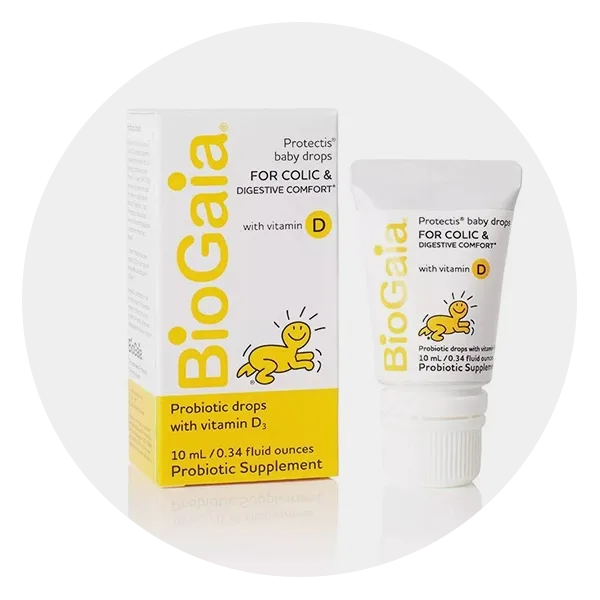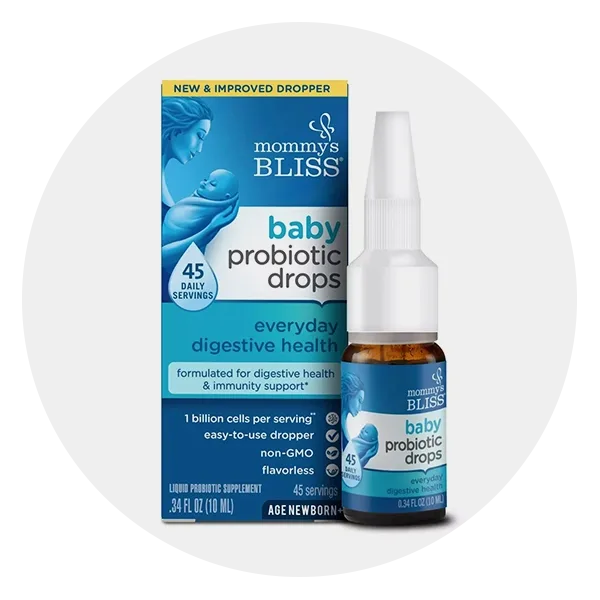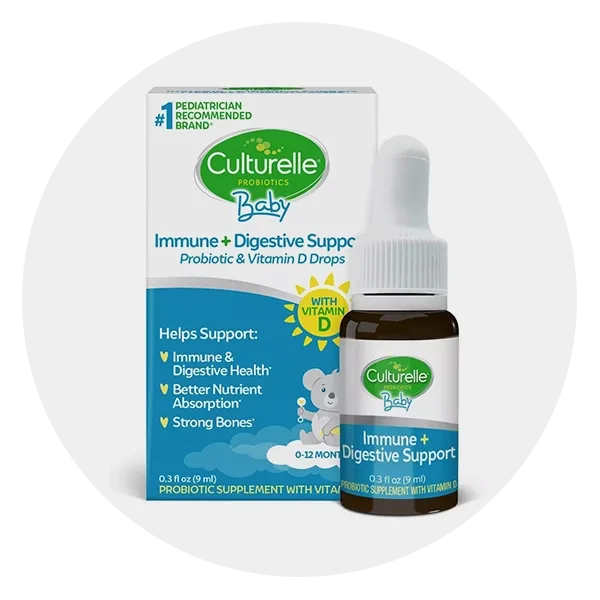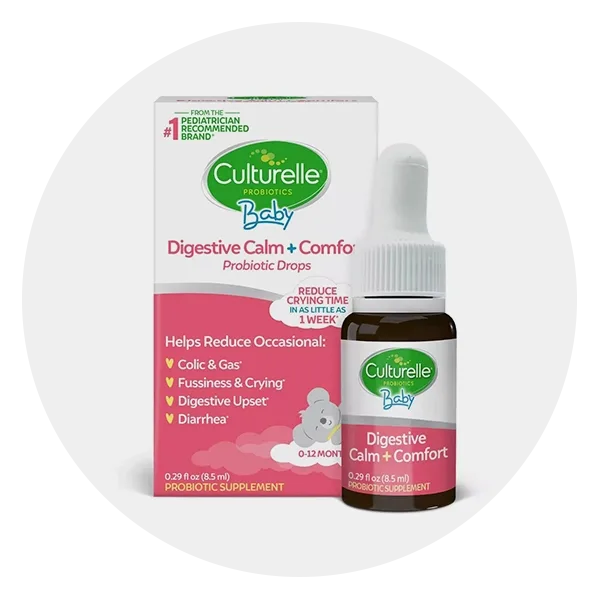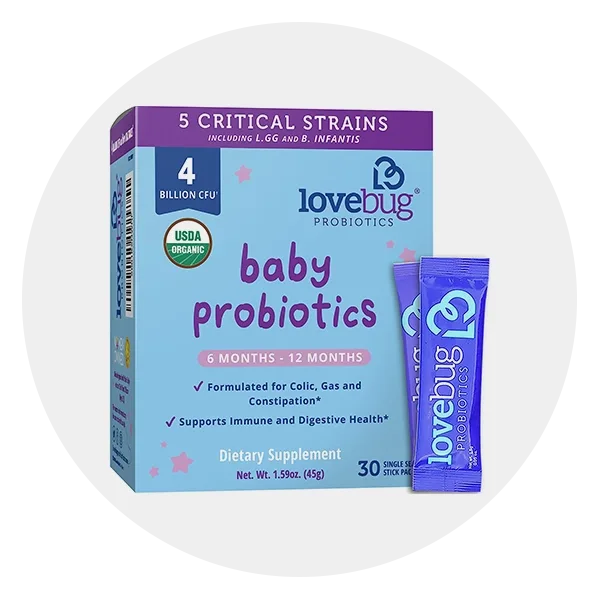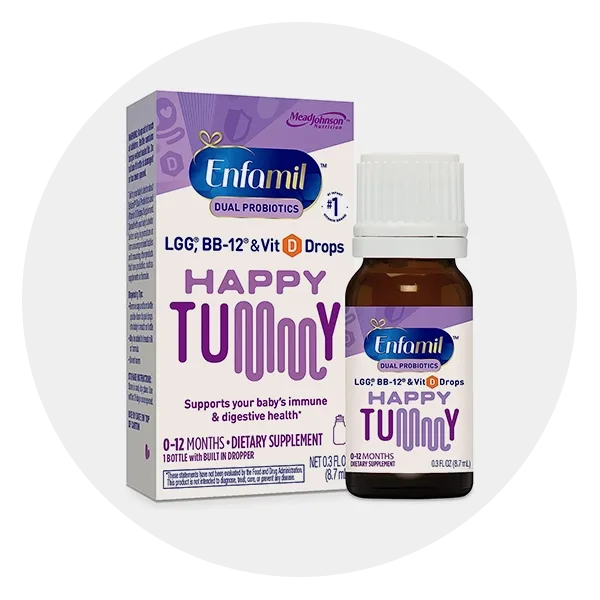Is It Safe to Give Baby Probiotics? Experts Weigh in
Walk into a drug or grocery store and you’ll spot any number of products touting probiotics (a good kind of bacteria) as an added health benefit—even in the baby aisle. What started with yogurt has now spread to an almost $2 billion-a-year industry in the US, complete with products enhanced with probiotics, including chocolate, gummies, infant drops and even some baby formulas.
It’s not surprising: Specific probiotics have shown some promise in clinical studies to aid digestive health in their attempt to balance the body’s gut microbiome, the living organisms that inhabit our digestive tract. But how much do we really know about probiotics for babies? Are they safe and effective? How can you identify which are the best baby probiotics out there? Here, we break down the basics—and have several experts weigh in.
Many of the good bacteria that baby probiotics contain are the same or similar to the microorganisms that live naturally in our bodies—namely in our digestive tracts, but also in places like our noses and a mother’s breast milk. Baby probiotics feature different bacteria species and strains depending on the condition they aim to treat: lactobacillus and bifidobacteria are two bacteria groups commonly found in probiotics for babies. They’re sold in formats that are easy to administer to infants: drops and powders that you can mix into milk; some come as added ingredients in baby formulas.
In situations where a baby’s gut microbiome may be disrupted—like when they’ve had a course of antibiotics, which kills off beneficial bacteria just as much as the pathogens they’re targeting—giving your little one a probiotic for babies could help restore the balance of good vs. bad strains. “If there is a belligerent ecosystem in your gut, the probiotic can bring peace,” says Alessio Fasano, MD, a pediatric gastroenterologist and the director of the Mucosal Immunology and Biology Research Center at Massachusetts General Hospital. “Their function is beneficial for us, but the confusion and mixed messages you get about the use of probiotics is based on the fact that we’ve started to widely use them before knowing exactly what they do and why they should be used.”
One of the main questions that arises when discussing baby probiotics is: Are they safe for infants? When it comes to preterm infants, it’s best to speak to your pediatrican first since there are new reports they could cause potential harm, and there are many dissenting views on the topic. Most recently, in October 2023, the US Food and Drug Administration (FDA) released a new warning raising concerns about the use of baby probiotics to treat or prevent diseases in preterm infants, in response to the death of a child earlier this year. “Any death or adverse event in an infant following the use of a probiotic product is very concerning,” states the FDA, writing that the agency “is actively working with healthcare providers to better understand the link between the probiotic products used and the adverse events in preterm infants reported by these institutions.” Likewise, it’s important to remember that “the FDA has not approved any probiotic product for use as a drug or biological product in infants of any age.”
The American Academy of Pediatrics (AAP) also doesn’t recommend the use of probiotics in preterm infants. That being said, they acknowledge that “approximately 10% of extremely low gestational age neonates receive a probiotic preparation during their stay in the NICU.” This is an effort to reduce the risk of necrotizing enterocolitis (NEC)—an inflammation of the intestines that can lead to severe infection—and all-cause mortality. Mark Underwood, MD, the chief of neonatology at UC Davis Children’s Hospital notes strong evidence showing that very preterm babies—those born at less than 32 weeks of gestation or with a birth weight of less than 3 pounds 5 ounces—who are treated with a probiotic are less susceptible to NEC. “Their risk goes down by half,” Underwood says. Still, giving preemie infants baby probiotics is not commonplace in the US, as some studies have shown marginal or no benefits at all, he adds.
In light of the FDA’s recent announcement, Underwood states: “In my view, the risks of providing probiotics to preterm and term infants haven’t really changed.” He continues, “the FDA has never approved the use of probiotics for the prevention of any disease and that has not changed. The best advice to parents of preterm infants in the NICU is to discuss the risks and benefits of probiotics with their physician.” Due to these recent warnings, we don’t offer a recommendation for the use of baby probiotics with preterm infants; we echo Underwood’s statement that the best person to speak to about the products is your child’s pediatrician.
Probiotics for full-term infants don’t often pose safety concerns or cause side effects, but don’t buy them over the internet if you can’t verify exactly where they’re coming from, says Gail Cresci, PhD, an expert in pediatric gastroenterology at Cleveland Clinic Children’s. Because most baby probiotics are considered dietary supplements, they’re not required to be as rigorously formulated and tested as medicines are, although that may change, according to the FDA. Looser restrictions mean a probiotic could very likely contain fewer microorganisms than its label promises; it might also contain more or different strains of bacteria than it claims to, says Underwood, who has overseen tests on probiotics his staff bought at drugstores.
What’s more, full-term infants who are immunosuppressed shouldn’t take probiotics, as their systems may “reject the probiotic and cause a problem,” Cresci says. If your child is set to receive a powder-based baby probiotic in a hospital setting and has an IV or other catheter, be sure that the supplement gets mixed in another room. “Those probiotics can become airborne and get inside an end-dwelling catheter and become asystemic—it’s not normal to have bacteria in your bloodstream,” says Cresci.
It’s hard to predict how effective baby probiotics are at enriching a full-term infant’s microbiome, which in the first few years of life helps map the development of their immune response system. Research into probiotics for babies is still in its infancy, and much of it is a mixed bag. “The findings aren’t always consistent,” says Stephen Eppes, MD, director of pediatric infectious disease at ChristianaCare. “What are the species of microorganisms? What is the concentration you’re looking at? Do the probiotics survive going through the stomach and get to the intestines? A lot of these studies have not always addressed these major points.”
A gut that’s off-kilter could predispose a baby to various illnesses later in life, such as allergies, autoimmune diseases or diabetes. “There’s compelling evidence that a lot of the things that have helped us stay healthy—c-sections and antibiotics and good hygiene practices—are changing intestinal microbiota that have been with us for millions of years,” says Underwood. “The compelling question for parents is, ‘is there something I can do to help my baby develop a healthy gut microbiota that will have a long-term impact?’ That’s the key question yet to be worked out.”
A baby probiotic may be beneficial for healthy full-term babies if they have any of these risk factors, which are believed to have the potential to alter an infant’s gut microbiome, according to Underwood:
- Birth by c-section
- Being administered antibiotics shortly after birth
- A mother who took antibiotics during labor
- Lack of breastfeeding
- A prolonged stay in the hospital after birth
When asking your child’s pediatrician about probiotics for babies, Underwood also says to consider your family’s history of certain diseases like allergies, diabetes and Crohn’s. Research has shown that babies who have more good bacteria in their poop could be less likely to contract some of these later on, he says.
Research shows that probiotics for babies can be used to better specific health conditions—sometimes. “Always check with your physician. Because probiotics are strain-specific, there isn’t one-size-fits-all,” said Cresci, noting that one species of bacteria can contain hundreds of strains; some strains work for some things, while others don’t work at all.
Conditions where studies have shown baby probiotics to have varying degrees of benefits include:
• Probiotics for babies with diarrhea. The best baby probiotic use case so far relates to antibiotic-related diarrhea, Fasano says. A recent meta-analysis of 33 studies concluded that for every nine children treated with antibiotics, probiotics—especially L. rhamnosus or S. bouldardii—will prevent one case of diarrhea.
• Probiotics for babies with diarrhea from rotavirus. Studies have shown that certain baby probiotics—namely L. rhamnosus—could cut the time some babies suffer from diarrhea caused by rotavirus by up to 24 hours.
• Probiotics for babies with colic and gas. Though doctors don’t know much about what causes colic and the gas that’s likely associated with it, some think it stems from undeveloped digestive systems and/or gut imbalances. A 2014 clinical trial involving 468 healthy newborns showed that babies who received baby probiotic drops containing an L. reuteri strain cried for about half as long each day vs. those who didn’t; they also regurgitated fewer times than the babies who didn’t receive the supplement.
Decided to give baby probiotics a try? The next step is figuring out how to choose the best baby probiotic for your little one. Start with what your child’s pediatrician says. Keep in mind, though, that “it’s not easy for a parent or doctor who is trying to keep up on all the literature to say one brand is better over another,” Underwood says.
It’s also hard to know if the bacteria strains present in a certain baby probiotic are the same ones tested in lab settings; many products don’t mention everything they contain. “One of the hardest things is translating what we see in research studies into general practice,” Cresci says. “You may get a strain that looks great, but to get that into a commercialized product is challenging—you have to make sure the bacteria are live and they’re going to grow and maintain their viability until someone is going to consume them.”
Your best bet is to look at some of the studies, note the bacteria used and compare that to the ingredients listed on the boxes of baby probiotics you see on store shelves. Well-known brands like Culturelle and Florastor offer powder packets to help combat diarrhea; BioGaia, Garden of Life and Gerber offer baby probiotic drops with bacteria species shown to possibly help with colic (as does infant formula from Gerber); and Enfamil offers a probiotic-enhanced formula that could help with diarrhea.
Many other baby probiotics contain bacteria that supposedly mimic the good microbes found in breast milk, but most experts don’t yet recommend giving healthy babies probiotics to improve overall health. “Using a probiotic to fix something without knowing what’s wrong is not logical,” Fasano says. “We still don’t have the key answer to the question, ‘what is a normal microbiome?’—it depends on who you are, and we’re still trying to figure that out.”
Now that you have all of the facts (and have checked with baby’s physician!), you’ll know what to look for when picking out the best baby probiotics for your little one. Here, check out our top picks.
Overall best baby probiotics
- Contains L. reuteri Protectis to reduce colic and gas
- Free from major allergens
- Some reviewers wish it came with an oral syringe
First up on our list of the best baby probiotic drops is this option from BioGaia, a leading probiotic brand around the globe. The formula contains L. reuteri Protectis, which has been shown to reduce symptoms of colic and gas, as well as spit-ups and occasional constipation and diarrhea. Give baby five drops once a day (via a spoon or your finger) and expect regular, healthy poops in no time!
Size: 0.3 fl. oz. | Age rating: 0+ months
Best baby probiotic drops
- Made entirely from vegan ingredients
- Free from major allergens
- Cloudy, yellow appearance is normal
- Do not place glass dropper directly in baby’s mouth
Searching for vegan baby probiotic drops? Look no further than this supplement from Mommy’s Bliss. The flavorless formula comes with a user-friendly dropper to make giving it to baby as easy as can be. To support your little love’s digestive system and immune function, it’s made with lactobacillus rhamnosus GG, a beneficial bacteria. Better yet, these infant probiotic drops are also free from major allergens for added peace of mind.
Size: 0.3 fl. oz. | Age rating: 0+ months
Best baby probiotics for digestion and immune support
- Made with two probiotics to support digestion
- Vitamin D for healthy development
- Free from major allergens
- Yellow color and creamy consistency is normal
- Don’t wash the dropper in between feedings
This workhorse baby probiotic will help promote all-around development in baby. Let us explain: It’s made with two probiotics (lactobacillus rhamnosus GG and bifidobacterium animalis subsp) to ease tummy discomfort in infants—but that’s not all. This formula also contains vitamin D to foster the growth of strong bones and a healthy immune system. Apply five drops before breastfeeding, into baby’s bottle or directly into their mouth once a day for optimal results.
Size: 0.3 fl. oz. | Age rating: 0 to 12 months
Best baby probiotics to ease digestion
- According to reviewers, it’s easy to administer
- Shown to reduce crying time in just one week
- Free from major allergens
- Slightly smaller bottle than other options
- Yellow color and creamy consistency is normal
- Don’t wash the dropper in between feedings
Next up is another top-notch baby probiotic to aid your little one’s digestion. This supplement features lactobacillus rhamnosus GG and bifidobacterium animalis subsp to alleviate upsetting symptoms and help baby establish a healthy microbiome throughout their first year. As a result of using these baby probiotic drops daily, you can expect reduced crying time over the course of just one week.
Size: 0.3 fl. oz. | Age rating: 0 to 12 months
Best baby probiotics powder
- Very colicky babies can take two powder packets a day
- Certified USDA organic
- Can’t be added to warm food or drinks
If your little one isn’t a fan of drops, consider a baby probiotics powder, like this option from Lovebug. This supplement can be mixed into any chilled food or drink, making it super-easy to administer. Once baby takes it, you can count on the probiotics (lactobacillus rhamnosus GG and bifidobacterium animalis subs, to be exact) to alleviate digestive issues, like colic, gas, fussiness, chronic blowouts and constipation. For infants who are especially colicky, use two packets a day for additional support.
Size: 1.6 oz. each | Age rating: 6 to 12 months
Best dual baby probiotics
- Made with two probiotics to ease digestion
- Vitamin D for immune support
- Great for both bottle- and breastfed babies
- Requires six drops to be given to baby once a day
- Do not warm
Last but definitely not least are these stand-out dual infant probiotics to foster healthy digestion and immune support in babies. You’ll appreciate how these drops contain an array of beneficial ingredients, such as vitamin D to build strong bones, as well as lactobacillus rhamnosus GG and bifidobacterium animalis subs, the two leading probiotics. Whether a baby is bottle- or breastfed, these probiotics for infants will complement the nutrients they get from feeding, to keep them on a healthy track.
Size: 0.3 fl. oz. | Age rating: 0 to 12 months
It’s no secret that new parents want the very best for their infants, and that includes everything feeding and nutrition-related. To help you identify the best baby probiotics for your child’s needs, we did the bulk of the research for you, so you don’t have to spend hours scrolling through online retailers. We did this by considering several factors when sourcing baby probiotics for our roundup. These include ingredient lists, product size, formula type (ie. drops or powders), value and, of course, safety. We also read user reviews to understand how these supplements have worked for real infants, and didn’t consider anything with less than an average four-star rating.
To ensure that we’re highlighting baby probiotics that are safe and effective, we chatted with experts, including two pediatric gastroenterologists, a director of pediatric infectious disease and a neonatologist. This way, you’ll be aware of essential features and safety considerations to keep top of mind as you shop and use these supplements. Last but not least, we also followed relevant medical studies from leading researchers, and consulted recommendations from the FDA for additional guidance.
Interested in learning more about our editorial process? Read about how our team develops and reviews all articles here.
Please note: The Bump and the materials and information it contains are not intended to, and do not constitute, medical or other health advice or diagnosis and should not be used as such. You should always consult with a qualified physician or health professional about your specific circumstances.
Plus, more from The Bump:
Alessio Fasano, MD, is a pediatric gastroenterologist at Massachusetts General Hospital, where he serves as the division chief of pediatric gastroenterology and nutrition and the director of the Mucosal Immunology and Biology Research Center. He earned his medical degree from the University of Naples School of Medicine.
Stephen Eppes, MD, is the director of pediatric infectious disease at ChristianaCare and also serves on the emeritus staff at Alfred I. duPont Hospital for Children. He earned his medical degree from the University of South Florida in Tampa.
Mark Underwood, MD, is the chief of neonatology at UC Davis Children’s Hospital. His research is focused on the development of intestinal innate immunity and mechanisms of probiotics and prebiotics in preterm infants. He received his medical degree from the University of Texas, Southwestern Medical School in Dallas in 1987.
Gail Cresci, PhD, is an expert in pediatric gastroenterology at Cleveland Clinic Children’s, where she has worked since 2010. Her research centers around the gut microbiome, gut metabolome and digestive diseases.
US Food and Drug Administration (FDA) “FDA Raises Concerns About Probiotic Products Sold for Use in Hospitalized Preterm Infants”, October 2023
American Academy of Pediatrics (AAP), “Use of Probiotics in Preterm Infants”, June 2021
National Library of Medicine, “[Probiotics and Necrotizing Enterocolitis](https://www.ncbi.nlm.nih.gov/pmc/articles/PMC5844696/#!po=26.7857)", November 2017
FDA, “Policy Regarding Quantitative Labeling of Dietary Supplements Containing Live Microbials: Guidance for Industry”, September 2018
Cochrane, “Probiotics for the prevention of antibiotic-associated diarrhea in children”, April 2019
National Library of Medicine, “Efficacy of probiotic use in acute rotavirus diarrhea in children: A systematic review and meta-analysis.”, Autumn 2015
JAMA Pediatrics, “Prophylactic Use of a Probiotic in the Prevention of Colic, Regurgitation, and Functional Constipation: A Randomized Clinical Trial.”, March 2014
National Library of Medicine, “Probiotic supplementation and associated infant gut microbiome and health: a cautionary retrospective clinical comparison.”, May 2018
Learn how we keep our content accurate and up-to-date by reading our medical review and editorial process.
Navigate forward to interact with the calendar and select a date. Press the question mark key to get the keyboard shortcuts for changing dates.

































